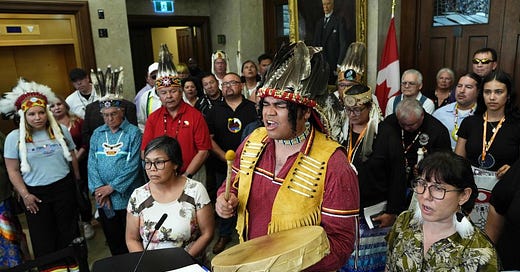Are Indigenous land rights at risk with new project amendments?
Las enmiendas al proyecto de ley podrían redefinir radicalmente la protección de derechos indígenas, generando un diálogo crucial sobre reconciliación.
Have you heard about the amendments to the major projects bill? They could drastically change how Indigenous lands are treated.
Assembly of First Nations National Chief Cindy Nepinak Woodhouse argues these changes don’t do enough to protect First Nations rights.
This situation raises critical questions about the government’s commitment to reconciliation.
Imagine the implications for new projects on Indigenous lands. How will this affect your community?
Consider talking to a legal expert on Indigenous rights or hearing from Indigenous leaders about their experiences. The conversation is just beginning, and it’s vital to engage.
¿Has escuchado sobre las enmiendas al proyecto de ley de grandes proyectos? Podrían cambiar drásticamente cómo se tratan las tierras indígenas.
La Jefa Nacional de la Asamblea de Primeras Naciones, Cindy Nepinak Woodhouse, argumenta que estos cambios no hacen lo suficiente para proteger los derechos de las Primeras Naciones.
Esta situación plantea preguntas críticas sobre el compromiso del gobierno con la reconciliación.
Imagina las implicaciones para nuevos proyectos en tierras indígenas. ¿Cómo afectará esto a tu comunidad?
Considera hablar con un experto legal en derechos indígenas o escuchar a líderes indígenas sobre sus experiencias. La conversación apenas comienza y es vital participar.
Language Notes
A. Vocabulary Boost:
– Enmiendas = Amendments – “Las enmiendas al proyecto de ley son un tema controvertido.” (The amendments to the bill are a controversial topic.)
– Tierra = Land – “Las tierras indígenas son fundamentales para la cultura.” (Indigenous lands are fundamental to culture.)
– Derechos = Rights – “Es importante defender los derechos de todos.” (It’s important to defend everyone’s rights.)
– Reconciliación = Reconciliation – “La reconciliación requiere esfuerzo de ambas partes.” (Reconciliation requires effort from both parties.)
B. Grammar Tip:
– Use of “podrían” (could) indicates possibility in Spanish: “Podrían cambiar drásticamente” translates to “They could drastically change.” It’s a conditional form that expresses potential outcomes.
C. Real-World Context:
– The term “Primeras Naciones” refers specifically to the First Nations peoples in Canada, highlighting the importance of recognizing Indigenous identities in discussions about land and rights.
– The phrase “compromiso con la reconciliación” reflects the ongoing dialogue about healing and justice in relationships between Indigenous peoples and governments, often emphasizing the need for sincere efforts and actions, not just words.




